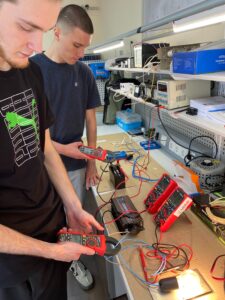
Ivano-Frankivsk Technical University of Oil and Gas (IFNTUOG) launched a modern laboratory for installing, adjusting, and operating photovoltaic power plants. The educational laboratory, funded by the USAID Energy Security Project (ESP), will train renewable energy sector specialists in Ukraine and is unprecedented among the education institutions in West Ukraine.
The laboratory is equipped with modern network photovoltaic FRONIUS (Austria) inverters, sets for building autonomous photovoltaic Victron Energy (the Netherlands) power plants, photoelectric module mounting systems from Kripter (Ukraine), and PVPP protection equipment from ETI (Slovenia), among other equipment. The laboratory is designed primarily to help students gain work experience through an internship under the “Renewable Energy Engineering” Bachelor’s program.
Andrii Yavorskyi, Associate Professor of the Energy Management and Technical Diagnostics Department (EMTD) at the University, stated: “The purpose of setting up such a laboratory is to provide students with maximum practical skills while mastering the specifics of a vocational profession through an internship. This approach is used at higher education technological institutions in the EU countries, the curricula of which are focused on a certain sector of the economy. In the EU, over 60% of studying is practice, and this approach significantly improves the quality of training of a future engineer and makes him (her) competitive in the job market.”

During the internship, students will be able to gain skills for the vocational profession and master the installation and maintenance of renewable energy systems (photovoltaic power plants), including:
- Mechanical installation of the PVPP support structures and equipment;
- Electrical installation of the PVPP equipment and systems;
- Control and measurement of all PVPP parameters that affect the operability, productivity, and operation safety of the power plant under IEC 62446:2009 and EN 62446;
- Adjustment of PVPP, means of commercial/process metering, monitoring of meteorological parameters, and remote monitoring systems.
“We are convinced that this approach to learning, implemented through the “Renewable Energy Engineering” program, will significantly increase the competitiveness of our graduates in the job market and will ensure the students’ practical readiness both for their first job and further development of the renewable energy sector in Ukraine,” says Andrii Yavorskyi.
The “Renewable Energy Engineering” bachelor’s program was launched by IFNTUOG in 2020 with the support of USAID ESP. The program focuses on training renewable energy specialists through practical knowledge they can apply from the first day of the program. The educational approach is based on a close connection between theory and the practical use of renewable energy technologies. It makes it possible to put the theory to the test immediately.
The EMTD Department already has laboratories for renewable energy, the physical basis of renewable energy, information technologies in energy, and now also for installation, adjustment, and operation of photovoltaic power plants – all equipped by funds provided through the USAID Energy Security Project.
The U.S. Agency for International Development (USAID) supports the “Renewable Energy Engineering” program through the USAID Energy Security Project to satisfy the demand in the renewable energy sector for qualified specialists and fill the gap between the educational possibilities of Ukrainian universities and the sector’s demand for specialists – men and women – with practical knowledge and skills.
